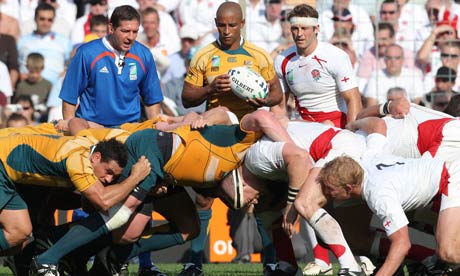
When Martin Johnson captained England no one, least of all Australia, doubted what they would be up against. The men in white, in those not so far off days, were direct, confrontational, efficient and clinical. They got opponents in a firm grip and kept on squeezing.
The movement that ended up with the experimental law variations started after England had won the 2003 World Cup. Set-piece efficiency had been complemented by the generally unerring kicking of Jonny Wilkinson. England had taken the science of rugby to a new level; artists in the southern hemisphere were appalled.
The England under Johnson as team manager are a different model. As the combined effect of the variations and the International Rugby Board's directive to referees to ensure the breakdown is not merely a means for the side in possession to recycle the ball produces a surfeit of kicking out of hand, with sides afraid of the consequences of running the ball in their own territory, the irony is that England offer hope of salvation.
They chose an attacking back three against the Pacific Islanders last week and Delon Armitage, Paul Sackey and Ugo Monye are all on duty against Australia on Saturday. While three internationals last weekend, Wales-South Africa, Scotland-New Zealand and France-Argentina, were blighted by long-range kicking, England counter-attacked.
Whether they will do so on Saturday, especially early on, is an intriguing question. England have beefed up their scrum with the return of Phil Vickery and Tom Palmer: it is the area where Australia have struggled most against them in recent matches, not least last year's World Cup quarter-final in Marseille when the Wallabies talked long before the match about how much work they had put into the set-piece only to produce no evidence of it.
That tournament marked the last stand of old England. Sheer bloody-mindedness and determination got them to the final, but they now carry the whiff of unpredictability, fired by attack-minded half-backs, Danny Care and Danny Cipriani. The Australia coach, Robbie Deans, admitted this week that he did not know what to expect from Johnson's charges, even if he is only too aware that it will not be a tea-party come scrum-time.
The line at Australia's team announcement was that what happened at Marseille would have no relevance this weekend. It was in the past, a different era, different teams. Someone forgot to tell the full-back Adam Ashley-Cooper. "I was really down for quite a while after that game," he said. "It really rocked me. I went home and didn't watch the last rounds of the tournament. I have already started to use that Marseille match as a bit of motivation. I am working towards those Poms: I'm angry and, if I get the opportunity, I will be going out to prove something at Twickenham."
Like England, Australia have an attacking back three and an opportunist outside-half in Matt Giteau. The mix is there for an attacking game, but will either side risk being caught in their own territory, especially in the opening 30 minutes?
The relative inexperience of both sides behind the scrum may prove a factor. Take away the Australia captain Stirling Mortlock, the wing Drew Mitchell, Giteau and England's Jamie Noon and Paul Sackey and there is a thread of rawness running through the two back divisions. That will bring an exuberance that, at times, will triumph over caution.
Australia had four average years after losing to England in the 2003 World Cup final and they took the bold step at the end of last year of appointing the first non-national as head coach of the Wallabies. Deans, who enjoyed considerable success at Canterbury Crusaders, had been expected to take over as New Zealand coach following the All Blacks' failure, and as soon as Graham Henry was invited to carry on, the Australian Rugby Union pounced.
Deans made an immediate impact and Australia now have a more abrasive air about them. While the prop Al Baxter has commanded media attention this week after previous scrum travails at Twickenham, the Wallabies have a powerful loose-head prop in Benn Robinson and a confrontational hooker in Stephen Moore. No team coached by Deans will run on to a field expecting to take a step backwards.
England had four poor years after winning the 2003 World Cup, never mind making last year's final. Johnson will not repair the damage in an instant, but his team is more a reflection of how the game in the Premiership has developed in the past couple of years than was the case in last year's Six Nations; but for all the boldness, pace and daring they have behind, no one knows more than Johnson that it starts up front. Which is why Andrew Sheridan had his backside publicly booted this week. The streaking pace of their back three is one thing, but England also need a streak of mean.

